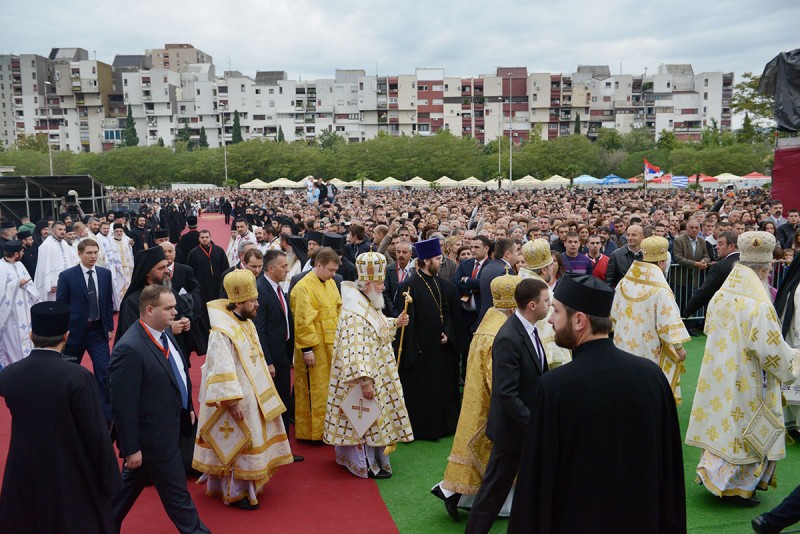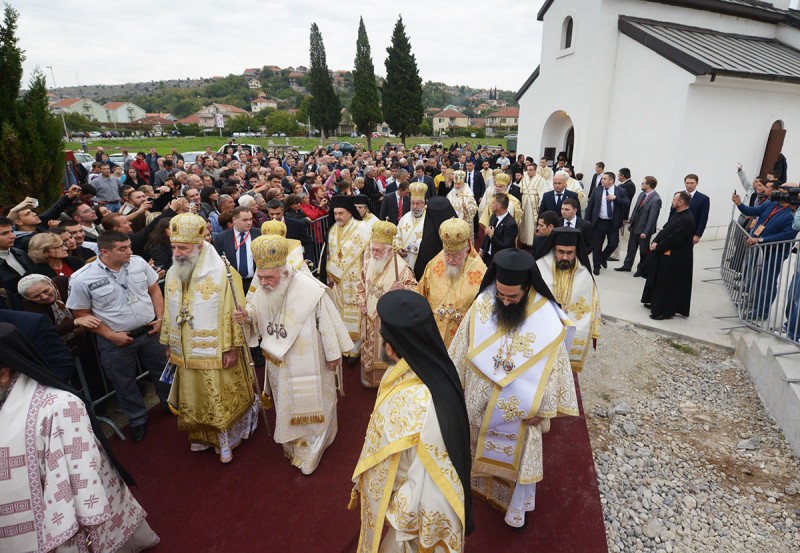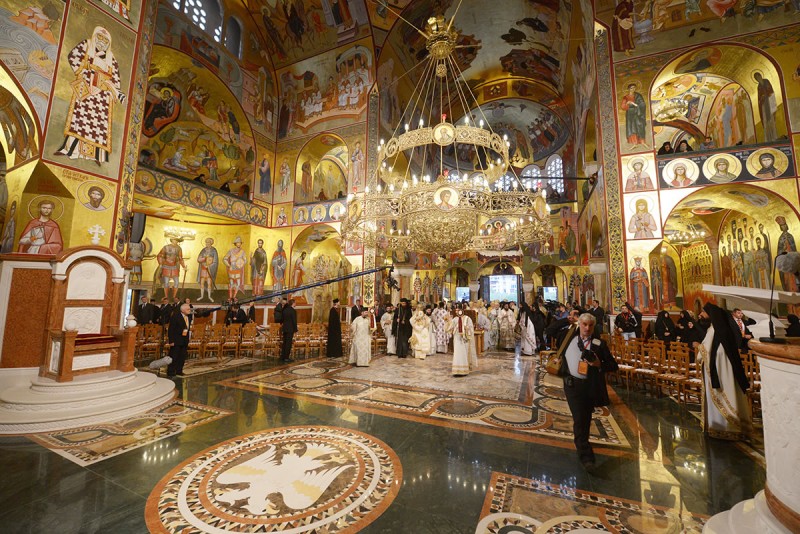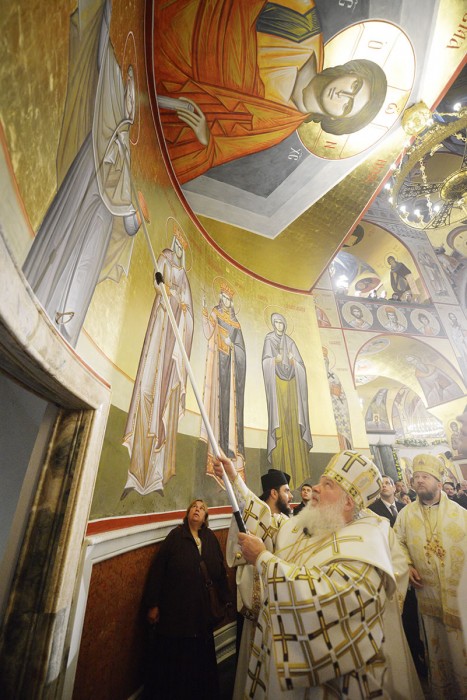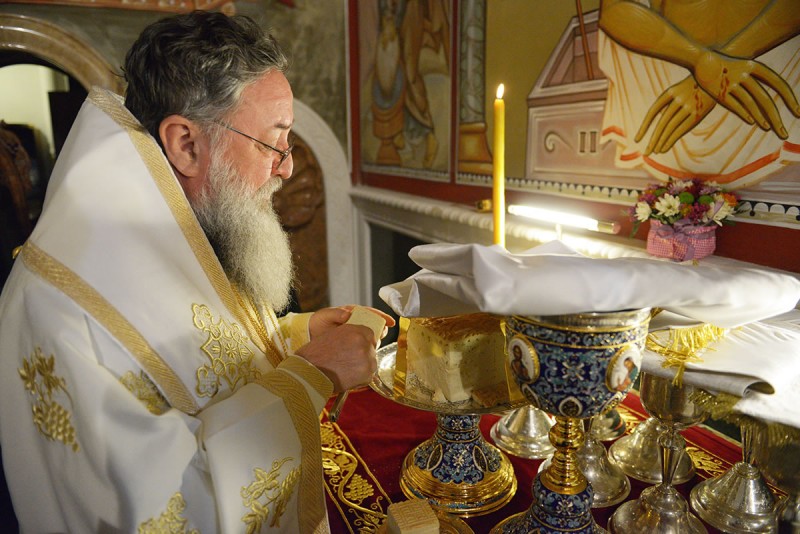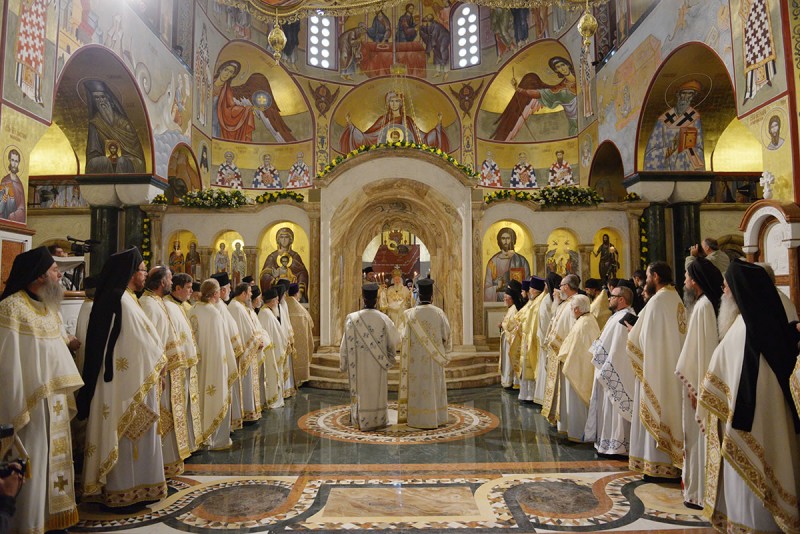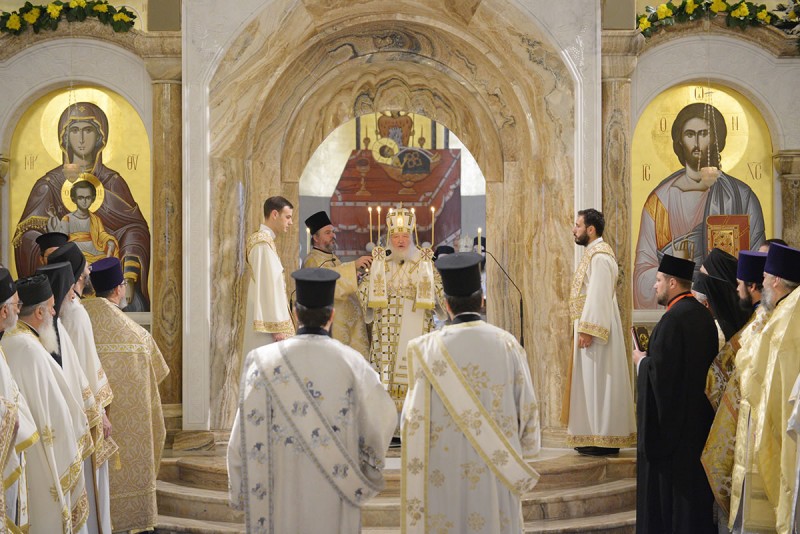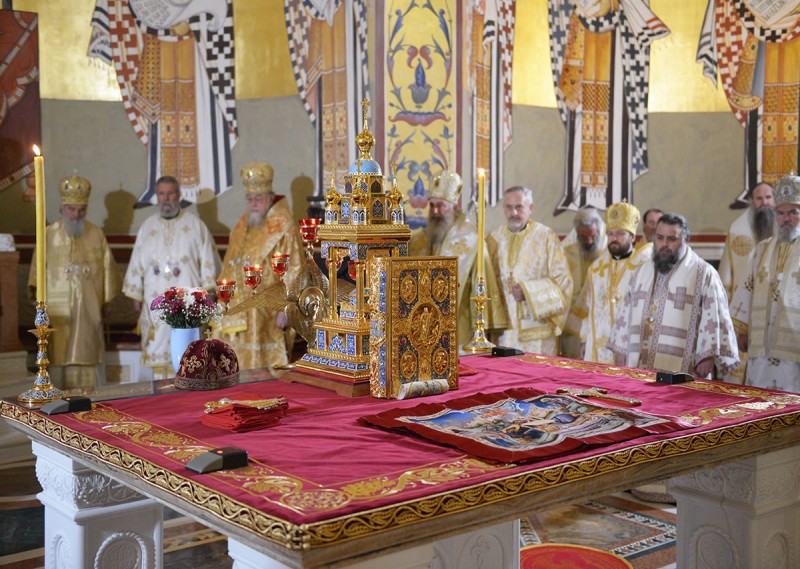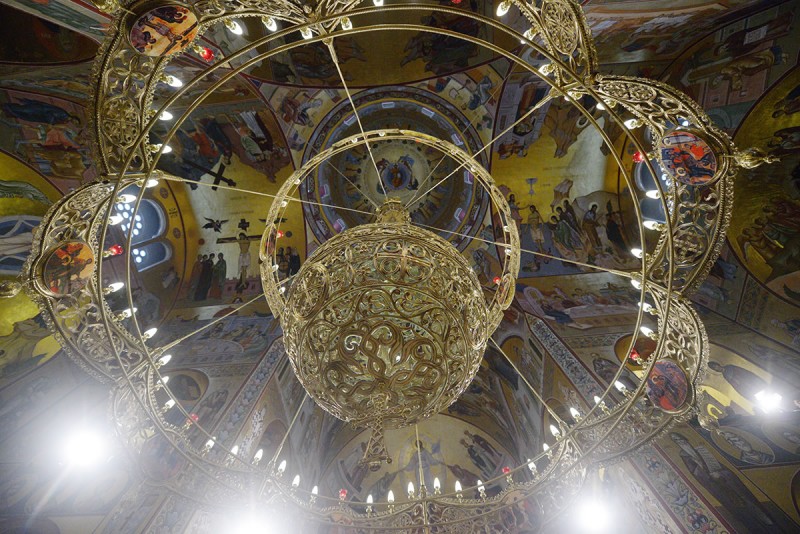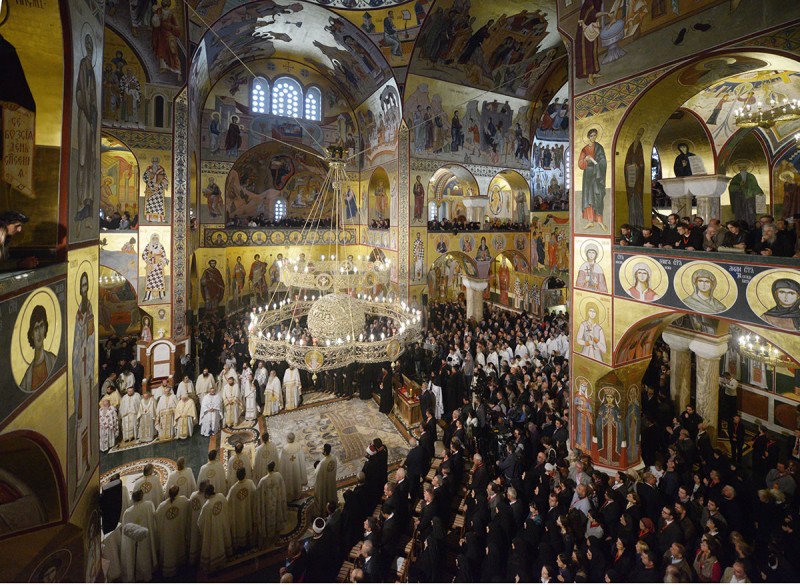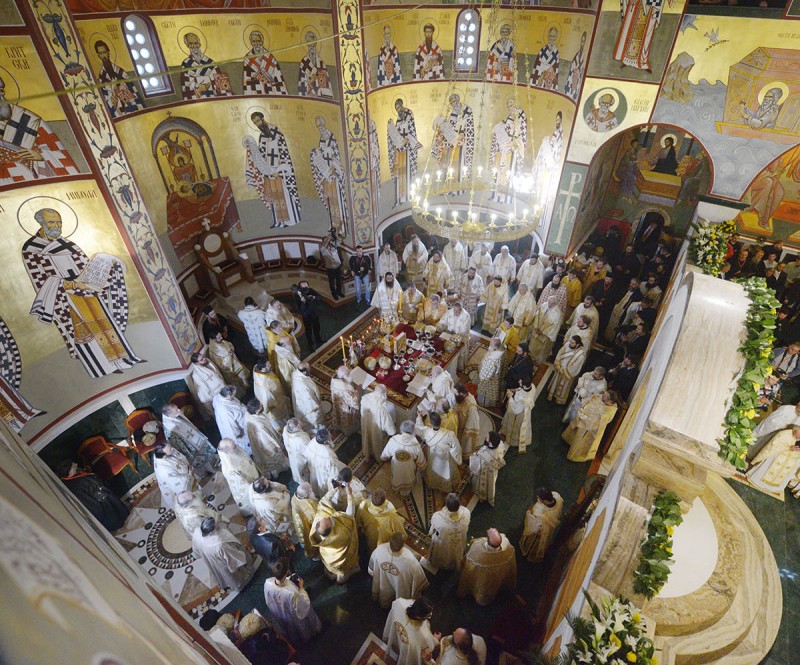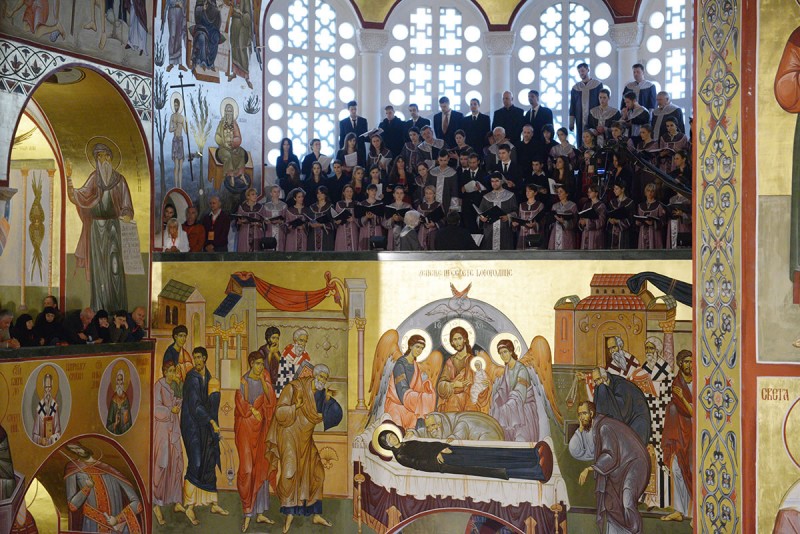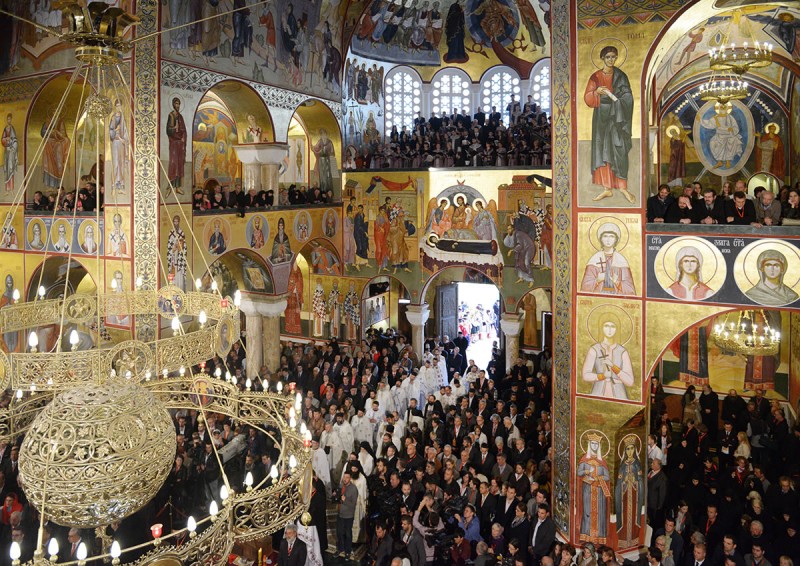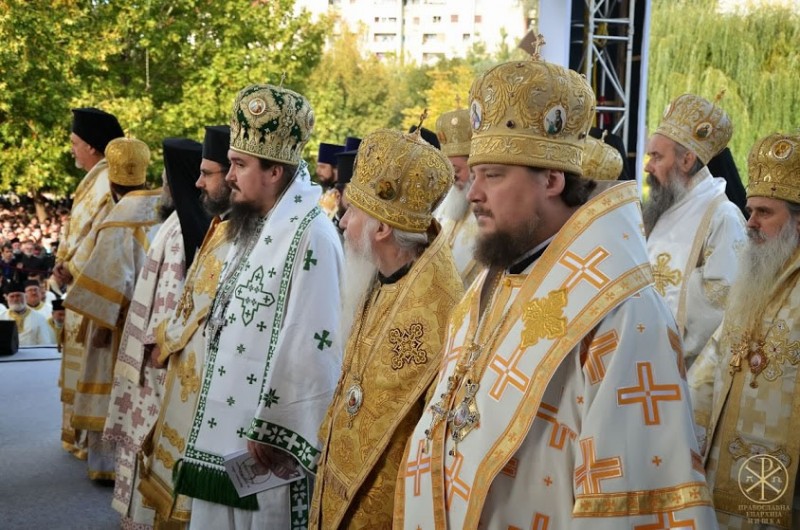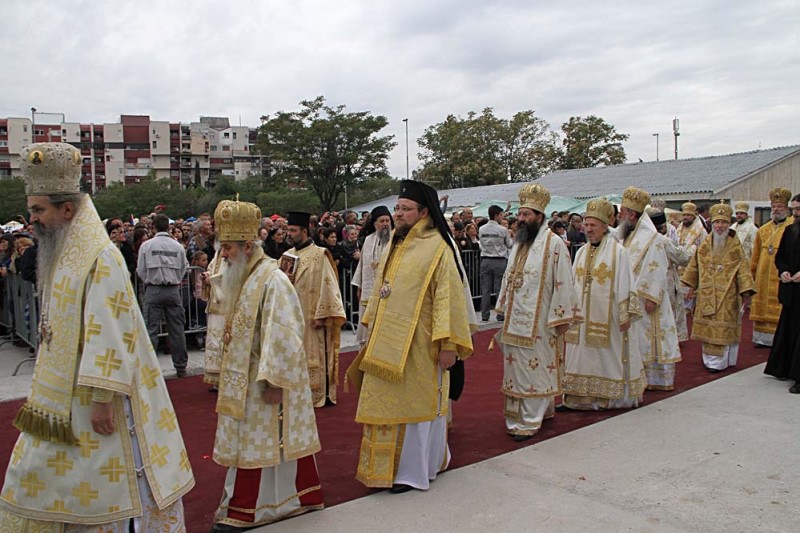The All-Orthodox Celebrations of the 1,700 th Anniversary of the Edict of Milan
On October 4-8, 2013, His Eminence Archbishop Mark of Berlin and Germany, as representative of the German Conference of Orthodox Bishops, participated in celebrations in Serbia devoted to the 1,700 th anniversary of the *Edict of Milan. Arriving in Belgrade on October 4, Archbishop Mark was able to meet with hierarchs of various Local Churches and exchange opinions on various matters in Church life.
On October 5, a ceremonious moleben was performed at Archangel Michael Patriarchal Cathedral, after which His Holiness Patriarch Irinej of Serbia welcomed the leaders and representatives of the Local Orthodox Churches and other guests. In his response, His Holiness Patriarch Bartholomew of Constantinople thanked Patriarch Irinej and elaborated on the importance of the Edict of Milan in Europe. After the moleben, President Tomislav Nikolic of Serbia invited the hierarchs to a banquet.
The visitors then traveled to the homeland of Holy Emperor Constantine, Equal-to-the-Apostle, the city of Nis, known in ancient times as Naissus, where the main celebrations were held. Archbishop Mark participated in divine services in the plaza before the cathedral. The services were celebrated by the Primates of Local Orthodox Churches: Patriarch Bartholomew; His Beatitude Patriarch Theophilos of Jerusalem; His Holiness Patriarch Kirill of Moscow and All Russia; Patriarch Irinej; His Beatitude Archbishop Chrysostomos of New Justiniana and All Cyprus; His Beatitude Archbishop Ieronymos of Athens and All Greece; His Beatitude Archbishop Anastasios of Tirana and All Albania; His Beatitude Metropolitan Savva of Warsaw and All Poland; His Eminence Archbishop Simeon of Olomouc-Brno, Locum Tenens of the Czech Lands and Slovakia; as well as a great number of Serbian hierarchs and members of official delegations of Local Orthodox Churches.
In his sermon, Patriarch Bartholomew, who officiated at the service, noted that today’s trend towards the equality of mankind independently of religion, race and national roots was to a great degree present in the Edict of Milan. Many nations try to manifest these principles; however, there are nations in which Christians live in difficult circumstances, suffering persecution and death. His Holiness also noted that in some countries that have been native homes of Christians, we observe that Christian culture is begin forced out, while these nations should especially remember their Christian roots. “As the soul is for the body, so are Christians for society,” said His Holiness. “We must once again demonstrate the meaning of the cross and Divine wisdom. Introducing order to Europe with its various nationalities, the rights of man, social responsibility of the states, equality, religious tolerance, all of this is inherent in the Edict of Milan, which manifests the principles of the Holy Gospel,” said Patriarch Bartholomew.
Later that day, Archbishop Mark and the other delegates went to Podgorica, Montenegro (Crna Gora), where they were welcomed on the plaza in front of the new cathedral with folk music and dances. Montenegran President Filip Vujanovic gave a fiery speech on Orthodoxy in his country. The following day, the newly-built Cathedral of the Resurrection of Christ was consecrated. During a procession of the cross, Archbishop Mark carried the holy relics which were placed under the altar table. President Nikolic was present at the consecration along with other Serbian government representatives, President Milorad Dodik of the Serbian Republic entity of Bosnia and Herzegovina , as well as representatives of Catholic, Protestant, Anglican and Muslim communities.
After the service, Patriarch Irinej thanked the hierarchs for their united prayers, and also congratulated His Eminence Metropolitan Amphilohije of Montenegro and the Littoral Lands on the completion of the construction of the magnificent new cathedral. Patriarch Bartholomew, who twenty years ago lay the cornerstone of the cathedral together with His Holiness Patriarch Alexey II of Moscow and All Russia and His Holiness Patriarch Paul of Serbia, said a few words in response. Patriarch Kyrill noted the history of Orthodoxy in Montenegro, but also spoke about Orthodoxy in Kosovo and Metochia.
The celebrations were widely covered in the local press, while the consecration of the cathedral was carried on live video feed.
*The Edict of Milan (Edictum Mediolanensium) of 313 AD was issued by Emperors Constantine and Licinius and proclaimed the freedom of worship on the territory of the Roman Empire. According to this edict, all religions were recognized as equal before the law; in this way, the traditional Roman paganism lost its status as state religion.
The edict specified Christians, referring to them as corpus christianorum, and ensured the return of all property of Christians and Christian communities which had earlier been confiscated. The Church thereby gained the status of a judicial person with all rights guaranteed within the framework of existing Roman corporate law.
The Edict of Milan was a continuation of an edict issued by Emperor Galerius from Serdica and posted at Nicodemia in 311, announcing the tolerance of Christians, permitting the construction of churches and performance of rites, which was an important step in the direction of declaring Christianity the state religion of the Roman Empire.
*The Edict of Milan (Edictum Mediolanensium) of 313 AD was issued by Emperors Constantine and Licinius and proclaimed the freedom of worship on the territory of the Roman Empire. According to this edict, all religions were recognized as equal before the law; in this way, the traditional Roman paganism lost its status as state religion.
The edict specified Christians, referring to them as corpus christianorum, and ensured the return of all property of Christians and Christian communities which had earlier been confiscated. The Church thereby gained the status of a judicial person with all rights guaranteed within the framework of existing Roman corporate law.
The Edict of Milan was a continuation of an edict issued by Emperor Galerius from Serdica and posted at Nicodemia in 311, announcing the tolerance of Christians, permitting the construction of churches and performance of rites, which was an important step in the direction of declaring Christianity the state religion of the Roman Empire.
Comments

